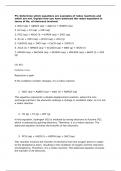Essay
UNIT 13B APPLIED SCIENCE UP TO DISTINCTION
- Course
- Institution
Here are the key points I would highlight in the assignment: P4/P6 - Practical Work Measuring cell potentials for various half-cell combinations (Zn/Cu, Zn/Pb, Pb/Cu) Calculating standard cell potentials and comparing to measured values Titrations: Fe2+/MnO4-, Na2S2O3/KIO3 standardization, I2...
[Show more]



